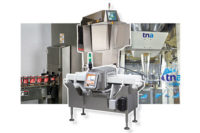Industry Trends: Q&A
Taking a Look at Industry Trends

Michelle Sauder is the North American senior marketing manager for food & specialty packaging at Dow.
Q: What types of materials have you seen an increased demand for in recent years?
A: We’ve seen increased demand for resins, adhesives, compatibilizers and coatings that can create a mono-material polyethylene (PE) structure to increase recyclability.
In North America, the only current collection system for flexible films is the store drop-off program that only accepts clean, all-PE films. Initially, we’ve seen a lot of dry food packaging convert to all-PE structures that can be processed in the store drop-off stream.
Dow offers several unique technologies that can make “hard to recycle” plastics recyclable through the store drop-off stream. For example, PE-EVOH barrier structures are historically hard to recycle, but Dow’s RETAIN Polymer Modifiers modify these formulations to make them acceptable in the store drop-off PE flexible film recycling stream.
Q: What do you see as the driving force behind the selection of these materials?
A: Brand owners have set aggressive sustainability goals for the next three to five years to make 100% of their packaging reusable or recyclable. This is driving the entire value chain to develop the right technologies and processes to increase recyclability while maintaining performance.
Sustainability is the driving force behind all we do at Dow, and we’ve made similar recyclability commitments, including our target to close the loop by 2035 by enabling 100% of Dow products sold into packaging applications to be reusable or recyclable.
We’re at a critical part of ongoing, collaborative efforts across the industry and alongside our customers, governments, NGOs and others to work together to identify and invest in new technologies to meet the demand for recyclable flexible film applications and to ultimately eliminate plastic waste.
Q: How has Dow had to adapt to this increased demand?
A: Sustainability isn’t new for Dow — we’ve been working for years on the right solutions to enable the move to more sustainable and recyclable all-PE structures. Now, more of our customers are asking us to help them find the right tools to address brand owner sustainability demands.
We’re expanding our Pack Studios capabilities to additional film extrusion with a new 9-layer line, and packaging converting equipment with a new stand-up pouch (SUP) line to help us test and validate new technologies alongside value chain partners. We also use our Pack Studios collaboration centers to support our customers with trials to expedite and simplify the shift to recyclable all-PE structures. This gives us the capacity and flexibility to quickly pivot to meet demand shifts and support our customers.
We have also increased our emphasis on designing for recyclability by making sure we have the right technologies to meet market demands. We provide recycle-ready technology on the front end, and — through partnerships and research we support — generate new uses for recycled plastics to create value.
Q: Which area in flexible packaging do you see as growing the fastest?
A: We see the highest growth in areas like medical packaging, e-commerce packaging and pet food packaging, based on consumer demographics and trends.
Demand for consumer staples like food and beverage will continue to grow alongside increased demand for recyclability, helping to drive circular economy progress. For example, consumer demand led to the development of a SUP, and demand for sustainability is motivating more brand owners to explore making them recyclable.
Q: Where do you see all of these elements leading the industry?
A: The industry is working together to address the plastic waste issue, developing a circular economy for plastics to maximize the value that plastic provides.
It will take a suite of solutions and diverse thinking to achieve this, which is why Dow focuses on advancing recycling and building new processes and technologies to eliminate plastic waste. For example, we’re a founding member of The Alliance to End Plastic Waste, and we’re excited about the American Chemistry Council’s From Single Use to Reuse industry-wide initiative.
For Dow, it has led us to put sustainability and recyclability at the foundation of new product design and development, simplifying the use of materials and working closely with partners and customers so flexible packaging can be cost-effectively recycled.
Q: Can you tell us about any new or upcoming Dow products?
A: We have many exciting developments in the pipeline, our INNATE TF 80 resin for BOPE is creating new possibilities for all-PE structures for SUPs and other packaging formats. We have several sealants in our AFFINITY Polyolefin Plastomer product line that enable low seal-initialization temperatures for faster line speeds.
We believe that our customers and brand owners shouldn’t have to choose between high-performance and sustainable packaging, so we focus on technologies that can deliver on both.
Q: Is there anything else you’d like to add that these questions haven’t addressed?
A: As it relates to our current environment, consumer buying behaviors have changed, and the longer COVID lingers, the more likely these behaviors will become the new norm.
There is increasing awareness that our behaviors do have a meaningful impact on the environment. For example, Los Angeles air quality improving due to people quarantining during COVID. Overall, this builds momentum to address plastic waste and climate change.
Now more than ever, embracing responsibility for addressing the problem is important for all companies in the industry. When we talk about sustainability and packaging, we must consider the impact of food waste. The issues of food insecurity — along with the increase in global population growth — makes it increasingly important to keep food fresh for as long as possible.
Dow offers products like SURLYN Ionomers, which have long been a go-to option for flexible packaging formats and have excellent secondary sealing and protein adhesion, making them great materials for extending freshness for meats, cheeses and other foods.
Looking for a reprint of this article?
From high-res PDFs to custom plaques, order your copy today!






